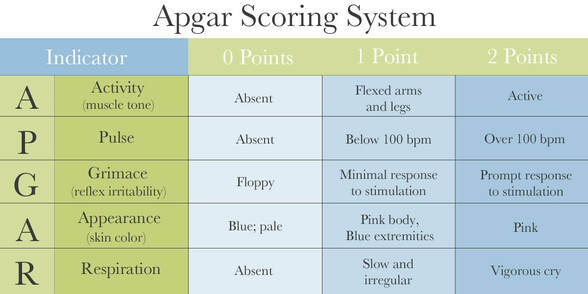Newborn Testing
Your little nugget has finally arrived and you and your family are full of joy. Shortly after birth your baby will be scored on how he/she is transitioning to the real world. This is called the Apgar Score. Your baby will be checked on 5 indicators (Skin Color, Heart Rate, Breathing, Muscle Tone and Reflex Response) once at 1 min after birth and again at 5 mins after birth. At each time he/she is given a score of 0, 1, or 2. A score of 2 means your baby is healthy and a score of 0 means your baby is not responding to an action. A total score of 5 or less means your baby may need oxygen or need medical intervention. A perfect score will be 10 however most babies will score between 7 to 10.
*The Apgar score cannot determine how healthy your baby will be when he/she grows up. This is only a test to alert doctors at birth.
While in the delivery room, if the mother has O blood type (RH negative), your baby's blood type will be tested. If the blood type of the baby comes back as incompatible (baby has A or B, or RH Positive), this can lead to problems with jaundice. If mom does not have O blood type, then they may not check the blood type of the baby.
Before you leave the hospital, your baby will go through newborn screening tests. This will help detect any conditions that are treatable. The baby will go through a metabolic screening, hearing screening, and pulse oximetry screening.
Metabolic Screening - this will test for developmental, genetic and metabolic disorders in your baby. If any of these disorders are found, they may be able to be treated before they cause any major health issues (all states in the US test for different diseases so check with your doctor to find out what test they are performing).
Hearing Screening - this will test to see if your baby has any hearing loss. It is important to detect if babies have any hearing issues because this can lead to having communication and language developmental issues later in life.
Pulse Oximetry Screening for Congenital Heart Disease - this test will measure how much oxygen is in your baby's blood. This has been proven to screen for some congenital heart diseases in babies.
These tests do not hurt your baby and cause little to no discomfort.
In the rare case that one or more of the tests comes back as positive, it is good to know as early as possible. If these conditions are left untreated, it can cause severe problems as your baby grows (developmental, organ damage or death). Most of these conditions can be treated with medications.
*Babies born outside of the hospital also need to be tested. The attendant helping deliver the baby will tell you when and where to get your baby tested. Every moment counts so please do not delay screening.
While in the delivery room, if the mother has O blood type (RH negative), your baby's blood type will be tested. If the blood type of the baby comes back as incompatible (baby has A or B, or RH Positive), this can lead to problems with jaundice. If mom does not have O blood type, then they may not check the blood type of the baby.
Before you leave the hospital, your baby will go through newborn screening tests. This will help detect any conditions that are treatable. The baby will go through a metabolic screening, hearing screening, and pulse oximetry screening.
Metabolic Screening - this will test for developmental, genetic and metabolic disorders in your baby. If any of these disorders are found, they may be able to be treated before they cause any major health issues (all states in the US test for different diseases so check with your doctor to find out what test they are performing).
Hearing Screening - this will test to see if your baby has any hearing loss. It is important to detect if babies have any hearing issues because this can lead to having communication and language developmental issues later in life.
Pulse Oximetry Screening for Congenital Heart Disease - this test will measure how much oxygen is in your baby's blood. This has been proven to screen for some congenital heart diseases in babies.
These tests do not hurt your baby and cause little to no discomfort.
In the rare case that one or more of the tests comes back as positive, it is good to know as early as possible. If these conditions are left untreated, it can cause severe problems as your baby grows (developmental, organ damage or death). Most of these conditions can be treated with medications.
*Babies born outside of the hospital also need to be tested. The attendant helping deliver the baby will tell you when and where to get your baby tested. Every moment counts so please do not delay screening.

